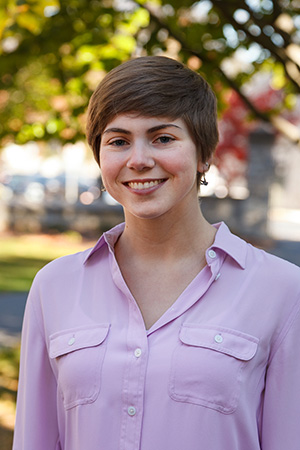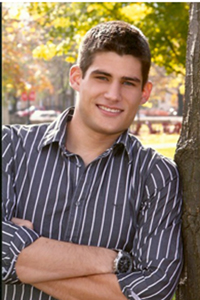After the Dickinson English Major

Bridget Jones '17 is an English major and Environmental Studies minor.
The Dickinson English major prepares students for a wide variety of careers. These students reflect on how their English major helped them move from college to a successful career.
Bridget Jones ’17
Bridget is from central New Jersey and grew up near the ocean and marshes that fostered her fascination with nature and wildlife plus sparked a lifelong interest in birdwatching. At home, Bridget directed her interest in the environment toward assisting local conservation efforts. While volunteering with the Monmouth County Park System and the Wreck Pond Watershed Association, she helped community members learn how to protect endangered birds’ nesting habitat.
At Dickinson, Bridget pursued her love of literature as an English major, while deepening her understanding of the natural world through Environmental Studies courses. During the summers, she worked with a branch of the New Jersey Audubon Society, where she created a display of the preserved property’s history. Exploring the intersections between English and environmental science has helped Bridget realize the important place communication and community outreach hold in conservation efforts. She is applying her writing skills to environmental protection and advocacy in a nonprofit or government organization.

Tyler Derreth '11, English
Tyler Derreth ’11
I am a 2011 Teach For America Corps Member teaching English in Baltimore City. At first, it might seem quite obvious how an English degree could be useful to an English teacher, but the Dickinson major experience helped me be successful in ways I could not have anticipated. My Dickinson education began helping me even before I got a job in Baltimore.
One of the best ways to get a teaching position in Baltimore is to go to a job fair where you have less than ten minutes to pitch yourself to various school principals—each one looking for a different teaching aspect. I went through five interviews that day and had to discuss in depth my thoughts on Darwin’s theories, Modern literature, and the influence of the English Renaissance on today’s American culture—each in less than ten minutes; this is the ultimate test of thinking on your feet. Certainly this is a difficult task to complete, but because of the analytical and interdisciplinary focus of the Dickinson major I was so successful I found myself with the rare opportunity of multiple job offerings. Of course, the Dickinson English major has become all the more useful now that I have a teaching position.
I teach everything from grammar and vocabulary to analytical reading and the writing process to over 100 eighth grade students every day. Obviously the English major gave me more than enough knowledge to teach these aspects of English successfully. The more important skill that this degree gave me is the ability to connect a literary focus to any other discipline in school. If you have spent any time with 13 year-olds, you know their minds constantly wander to seemingly unrelated topics. The discussion based learning that I received from Dickinson prepared me to handle and redirect these comments into relevant and interesting conversations (including one that ended up in an brief and basic explanation of deconstruction). I went to Dickinson to receive an English degree that would teach me how to think deeply, critically, and analytically about literature. I walked away achieving this goal, but more importantly I received my degree knowing how to apply my knowledge to engage an audience in any situation—even to a group of 13 year-olds.The Dickinson English major prepares students for a wide variety of careers. Below, two students-- one in business and one in education-- reflect on how their English major helped them move from college to a successful career.
Evan Gregoire ’11

Evan Gregoire '11, English
One skill that Dickinson English majors inherently develop throughout the pursuit of the major is academic adaptability. English majors are versatile because we are forced to be. Each class in the department poses radically different subject material and new arguments that need to be defended or assailed. An English major isn’t tasked with absorbing and regurgitating information. The process of researching a particular subject, developing an original opinion, and defending that position with beautiful writing makes the writer unique from his or her peers. It is a major that encourages individualism and versatility. These are the skills I found most helpful when searching for work in this less than optimistic job market.
I currently hold an analyst role at the Royal Bank of Scotland in Stamford, CT. When interviewing for this role, I spent a majority of the time detailing my English major. Even when applying for a job in the financial sector, my English major intrigued the interviewers – they wanted to know more about it. So I told them. They wanted to know more about my senior thesis. And I told them about that, too. The fact that we as Dickinson English majors are driven to excel as individual thinkers in a myriad of literary fields is appealing to any potential employer.
My advice to any young minds entering this job market is to emphasize the significance of this major. It’s not an easily earned degree, and for good reason. Let your potential employer know that you have the skills to manage long term projects, the ability to dissect and analyze complex information, and the versatility to do it all in whatever industry you damn well please. Most importantly, try not to worry yourself too much. Enjoy the last few months of college, wrap up that thesis, and know that you are well armed for life after school. Good luck, and happy hunting.